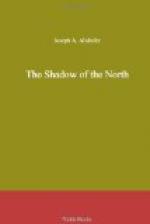His heated brain began to grow cool at last. The vivid pictures that had been passing so fast before his eyes faded. He saw only reality, the blazing fire, the dusky figures lying motionless before it, and the circling wall of dark woods. Then he slept.
Willet was the only white man who remained awake. He saw the great fire die, and the dawn come in its place. He felt then for the first time in all that long encounter the strangeness of his own position. The wilderness, savages and forest battle had become natural to him, and yet his life had once been far different. There was a taste of a distant past in that fierce duel at Quebec when he slew the bravo, Boucher, a deed for which he had never felt a moment’s regret, and yet when he balanced the old times against the present, he could not say which had the advantage. He had found true friends in the woods, men who would and did risk their own lives to save his.
The dawn came swiftly, flooding the earth with light. Daganoweda and many of the Mohawk warriors awoke, but the young Philadelphia captain and his men slept on, plunged in the utter stupor of exhaustion. Tayoga, who had made a supreme effort, both physical and mental, also continued to sleep, and Robert, lying with his feet to the coals, never stirred.
Daganoweda shook himself, and, so shaking, shook the last shred of sleep from his eyes. Then he looked with pride at his warriors, those who yet lay upon the ground and those who had arisen. He was a young chief, not yet thirty years of age, and he was the bloom and flower of Mohawk courage and daring. His name, Daganoweda, the Inexhaustible, was fully deserved, as his bravery and resource were unlimited. But unlike Tayoga, he had in him none of the priestly quality. He had not drunk or even sipped at the white man’s civilization. The spirituality so often to be found in the Onondagas was unknown to him. He was a warrior first, last and all the time. He was Daganoweda of the Clan of the Turtle, of the Nation Ganeagaono, the Keepers of the Eastern Gate, of the great League of the Hodenosaunee, and he craved no glory save that to be won in battle, which he craved all the time.
Daganoweda, as he looked at his men, felt intense satisfaction, because the achievement of his Mohawks the night before had been brilliant and successful, but he concealed it from all save himself. It was not for a chief who wished to win not one victory, but a hundred to show undue elation. But he turned and for a few moments gazed directly into the sun with unwinking eyes, and when he shifted his gaze away, a great tide of life leaped in his veins.
Then he gave silent thanks. Like all the other Indians in North America the Mohawks personified and worshipped the sun, which to them was the mighty Dweller in Heaven, almost the same as Manitou, a great spirit to whom sacrifices and thanksgivings were to be made. The sun, an immortal being, had risen that morning and from his seat in the highest of the high heavens he had looked down with his invincible eye which no man could face more than a few seconds, upon his favorite children, the Mohawks, to whom he had given the victory. Daganoweda bowed a head naturally haughty and under his breath murmured thanks for the triumph given and prayers for others to come.




